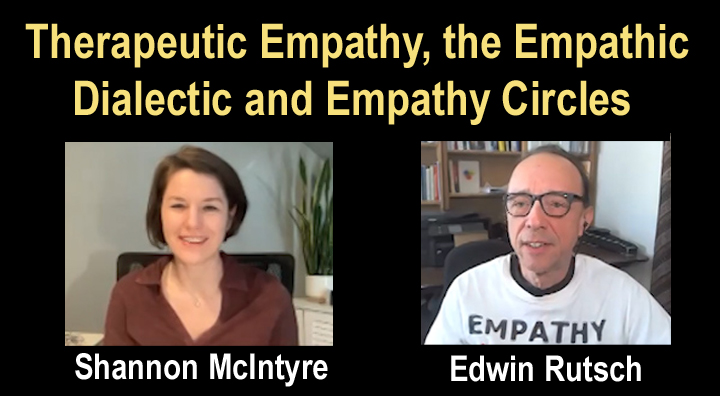|
|
Culture of Empathy
Builder:
Shannon McIntyre
|
|
|
|
|
|
|
About Therapeutic Empathy, the Empathic Dialectic
and Empathy Circles
Shannon McIntyre
|
|

View Video ON FACEBOOK or
ON YOUTUBE
|
|
Shannon McIntyre is an Assistant Professor in the Department of
Clinical Psychology at Antioch University New England. Shannon is broadly
interested in adult development from attachment-based and psychoanalytic
perspectives, as well as psychotherapy process and outcome. Initially, her
research interests were geared toward better understanding how
stigmatization impacts identity formation in women.
More recently, however, Shannon has been focused on the therapist
characteristics that facilitate and/or inhibit therapeutic empathy.
She has consequently presented at national conferences and co-authored
articles related to the empathic process. As a Research Associate at the
Program for Psychotherapy, Dr. McIntyre will continue to conduct research
on therapeutic empathy, and on topics related to psychotherapy more
generally.
Rogers contended that therapeutic empathy is best described
as a multi-dimensional process, which means "being sensitive, moment by
moment, to the changing felt meanings which flow in this other person...
and sensing meanings of which he or she is scarcely aware." |
Article
Papers
-
Therapist Experience, Personal Therapy, and Distressing States of
Mind: Regulation and Resonance as Dialectics of Therapeutic Empathy
(2019)
-
The
current study is based on the notion of an empathic dialectic,
marked by states of emotional resonance and regulation, which has
been described by contemporary theories of therapeutic empathy and
empirically supported by research on non-therapists.
-
An Integrative Review of Therapeutic Empathy The Complex Nature of
Therapeutic Empathy (2020)
-
McIntyre, S. L., & Samstag, L. W. (2020). An integrative review of
therapeutic empathy. Psychotherapy
Bulletin,
55(1), 12-18.
-
Drawing on contemporary theories and research, the current paper
suggested the phrase “empathic dialectic” to refer to therapists’
ability to shift from states of emotional resonance and
co-regulation, in order to effectively co-create corrective
emotional experiences with (and for) their patients.
-
Promoting an Empathic Dialectic for Therapeutic Change: An
Integrative Review (2021)
-
This
integrative review is focused on a formulation of therapeutic
empathy. We describe the “empathic dialectic” as therapists’
capacity to emotionally resonate with patients’ internal states,
such as during ruptures, and to coregulate their own and the
patients’ states through mentalization. The current study is
based on the notion of an empathic dialectic, marked by states of
emotional resonance and regulation, which has been described by
contemporary theories of therapeutic empathy and empirically
supported by research on non-therapists.
|